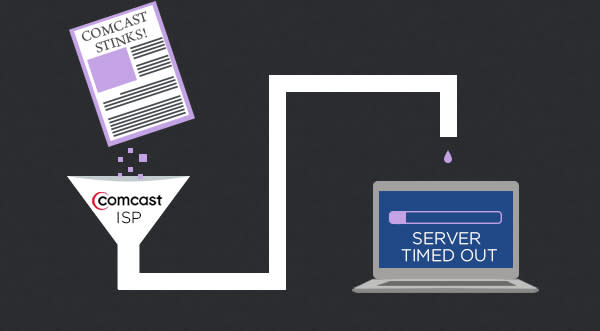5 Freedoms You'll Lose Without Net Neutrality
You expect your home Internet connection to "just work" like water and electricity. But what if the electric company provided inadequate power to your Whirlpool refrigerator, because Whirlpool hadn't paid a fee? And what if the water company completely cut off the flow from your Kohler faucet because it owned a stake in another faucet company?
Unlike public utilities, your Internet service provider (ISP) can abuse its power to influence which Internet businesses win and lose by slowing down or even blocking sites and services. However, with most homes having a choice of just one or two providers, consumers have little recourse. Under FCC’s “Open Internet Order, that a court struck down in January, wired broadband providers were forbidden from discriminating against any type of Internet traffic that flows through their pipes — a principle widely known as net neutrality. And there never were any rules to protect against wireless companies discriminating.
The FCC has proposed a new set of rules that would prevent ISPs from outright blocking anyone but would still allow them to deliver different services at different speeds. However, it's just a proposal, and right now, there is no sheriff in town.
More: Why The Latest FCC Net Neutrality Plan Is Meaningless
"AT&T, Verizon and Comcast will be able to deliver some sites and services more quickly and reliably than others for any reason. Whim. Envy. Ignorance. Competition. Vengeance. Whatever. Or, no reason at all," lawyer and Internet activist Marvin Ammori wrote in a Wired article shortly before the court's decision.
Comcast and Verizon have already exercised this new power by charging Netflix fees for delivering its video streams at higher speeds. But the loss of net neutrality affects more than Netflix's bottom line.
Emboldened by a toothless FCC, broadband providers could take away your most basic rights. Here are five freedoms you could lose if ISPs are allowed to control what you view and how fast you view it.
1. Freedom of the Press
If you wanted to start an international media company 20 years ago, you couldn't do it on your own. The barriers to entry — getting access to a printing press and developing the complex infrastructure to distribute your work — were huge. With the open Internet, however, anyone can start a news site and publish articles or videos, without worrying about whether people can read them.
Without net neutrality, ISPs can block or slow down news sites for any reason, be it commercial or ideological. For example, Comcast could block NYTimes.com or slow it to a crawl because the online newspaper published an op-ed in favor of net neutrality or even reported something negative about the company.
Optimum Online, which operates primarily in the New York area, could decide to block your access to the Seattle Post Intelligencer online because that publication wouldn't pay a fee to be carried. If every ISP charges content providers fees for reaching its customers, many publishers will simply decide that certain markets aren't worth reaching.
2. Free and Fair Elections
The large ISPs already have a major influence on politics, with Verizon alone spending $53 million on campaign donations and lobbying since 2010. However, without net neutrality, there's nothing to stop the ISPs from influencing elections even more directly. Your broadband provider could block the website of one candidate while speeding up that of another.
It could even censor the sites for political action committees that support a viewpoint or candidate it opposes. Back in 2007, Verizon initially refused to send out text messages from a pro-abortion rights group, but backed down under pressure. What if AT&T decides one day that it opposes capital punishment so much that it blocks prodeathpenalty.com and the site of any gubernatorial candidates that support the practice?
More: What Is Net Neutrality?
Activists of any stripe should be concerned about their right to publish content that an ISP might disagree with. In 2005, Canadian ISP Telus blocked the site of a labor group that encouraged its workers to strike.
Even more insidiously, ISPs can selectively block government websites that provide voter information like polling locations and registration forms. If they succeed in lowering voter turnout in certain areas, that could change the course of an election.
3. Freedom of Association
You always talk to your mom on Skype, but then your ISP signs an exclusive deal to make Google Hangouts its only allowed chat service. Meanwhile, Mom's ISP on the other side of the country serves Hangouts at unusable speeds, but gives Skype its fast lane. This scenario may sound crazy, but without any legal constraint, your ISP has every incentive to swing priority access deals with some messaging services while blocking others.
There's already a precedent for blocking messaging clients in the world of wireless broadband. Back in 2009, AT&T blocked the iPhone from making Skype calls on its mobile network, but relented under pressure from the FCC. In 2012, the company also blocked Apple FaceTime on the iPhone.
More: The Case Against Time Warner-Comcast Just Got Stronger
Of course, you and your mom can always talk on old-fashioned landline phones if you both still have them. Unlike broadband providers, wired phone services are defined as common carriers and are legally obligated to accept calls from anyone. VoIP services such as Vonage are exempt, as are cell phone carriers.
4. Freedom to Start a Business
If you decide to open up a restaurant in town and a street gang demands money not to destroy your place "Last Dragon" style, you'd call the police. But if your business lives on the Internet, you could have as many as a dozen different ISPs in the U.S. shaking you down and, without net neutrality, no legal recourse against them.
The most important question raised by net neutrality is not "should the government regulate the Internet" but "should a dozen ISPs be allowed to control thousands of other companies?"
Whether you're trying to start the next Netflix or you're a mommy blogger eking out a living on ad revenue, you could be forced to pay broadband providers in order to reach their customers. If you can't pay, providers could slow your site or service down to the point that nobody wants to use it.
More: Netflix Could Raise Fee to $15 and Keep Customers
The smart money is already abandoning many Internet startups. Since a court struck down the FCC's previous set of net-neutrality rules in January, some venture capitalists have stopped investing in businesses that involve video streaming or online financial transactions, both of which require fast speeds to work.
5. Freedom of Choice
You like to do all your shoe shopping at Zappos, but your ISP has an exclusive clothing deal with Walmart, so it slows down Zappos.com so badly that each page takes a minute to load and you get timeout messages when submitting your credit card information. You might be determined enough to keep visiting your favorite online shoe store despite these roadblocks, but most people won't.
You've been using Gmail as your primary email address for years, but your ISP decides to slow down that service and speed up Microsoft's Outlook.com instead. How long will you stick with the slow email over the fast one?
In a world where ISPs can slow down or outright block whatever services they like, your freedom to choose everything from your email client to your online university could disappear.
Follow Avram Piltch @Geekinchief and on Google+. Follow us @TomsGuide, on Facebook and on Google+.
Copyright 2014 Toms Guides , a TechMediaNetwork company. All rights reserved. This material may not be published, broadcast, rewritten or redistributed.




